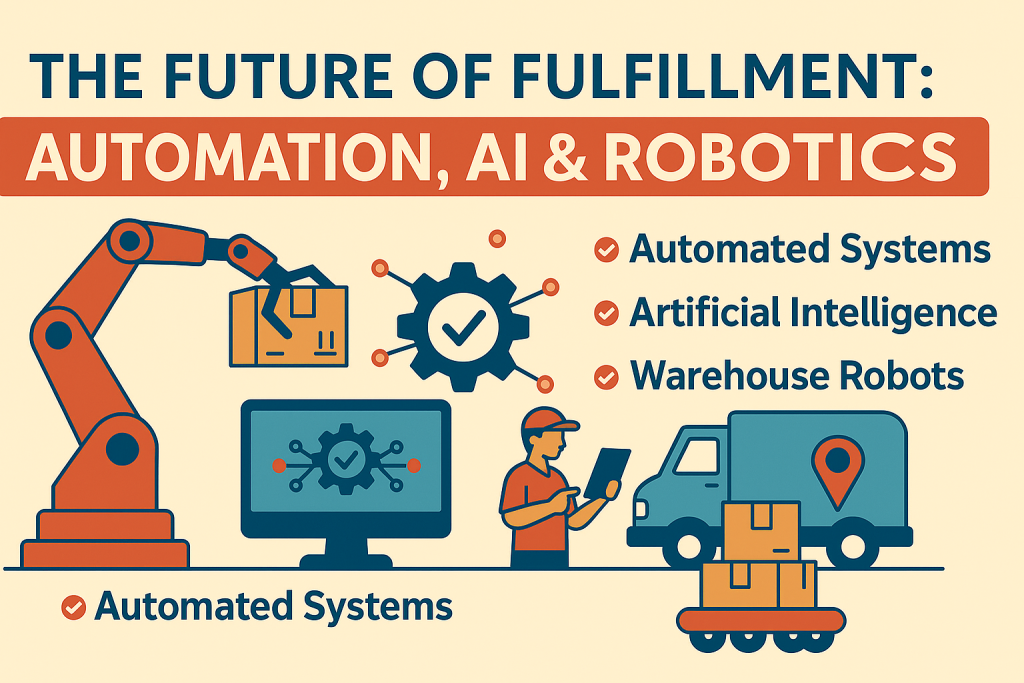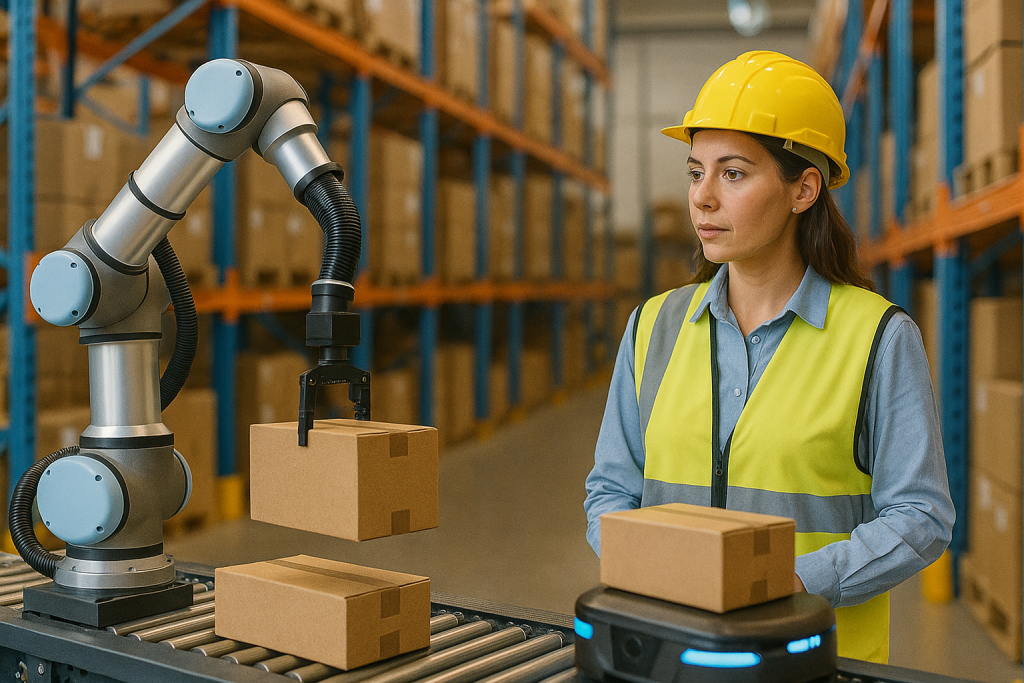By Martin Vassilev / 15 Aug, 2025

The fulfillment industry is undergoing a historic transformation fueled by automation, artificial intelligence (AI), and robotics. From advanced warehouse automation to predictive AI-driven inventory management, these innovations are not only changing the way products move through supply chains but also setting new benchmarks for speed, accuracy, and efficiency. Companies that adopt these technologies early stand to gain a significant competitive advantage, while those who resist risk being left behind.
The global e-commerce boom, evolving customer expectations for same-day and next-day delivery, and ongoing labor shortages are pushing logistics providers to reimagine fulfillment operations. Forward-thinking providers, such as ByExpress, are leading the way in integrating smart systems that deliver scalable, cost-effective, and customer-focused solutions.
Automation is no longer a luxury—it’s an operational necessity. Modern fulfillment centers are investing heavily in robotic picking systems, conveyor belt automation, and automated storage and retrieval systems (AS/RS) to eliminate manual inefficiencies.
Faster Order Processing: Automation allows facilities to process thousands of orders per hour with minimal human intervention.
Reduced Operational Costs: Robotics can significantly cut labor expenses and reduce costly human errors.
Scalability: Automated systems can easily scale up during peak seasons without the need for massive recruitment drives.
Enhanced Accuracy: AI-powered quality checks ensure precise picking and packing, reducing returns and boosting customer satisfaction.
To explore how these technologies improve operational efficiency, see how AI is transforming the logistics industry in 2025.
Artificial Intelligence is revolutionizing fulfillment in ways that go far beyond automation. Through machine learning algorithms, AI can predict order volumes, optimize picking routes, and forecast inventory needs—ensuring that products are always available when customers need them.
Predictive Demand Planning: Analyzes historical sales and seasonal trends to ensure stock availability.
Intelligent Routing: AI determines the fastest and most cost-effective delivery routes.
Automated Customer Service: AI chatbots and systems provide real-time updates and quick resolutions to queries.
Quality Control: Computer vision systems detect product defects before they are shipped.
For a deeper dive into AI adoption trends in warehousing, check out Integrating AI in Warehouse Management: Future Trends & Applications.
Robotics technology has reached a point where fully autonomous systems can handle picking, packing, sorting, and even last-mile delivery. These robots operate 24/7 without fatigue, drastically reducing lead times and operational costs.
Automated Guided Vehicles (AGVs): Transport products across warehouse floors.
Collaborative Robots (Cobots): Work alongside humans to enhance productivity and safety.
Robotic Picking Arms: Handle delicate items with precision.
Drone Deliveries: Accelerate last-mile fulfillment in select markets.
By combining robotics with AI, companies can create self-learning systems that continuously improve efficiency.

When these three forces combine, they create a hyper-efficient, self-optimizing supply chain. Imagine a fulfillment center where:
AI predicts the exact number of items needed.
Robots pick and pack those items.
Automated systems ship orders in record time.
This is the future of fulfillment—one that blends speed, precision, and cost-efficiency.
While the benefits are clear, businesses must navigate challenges such as:
High Initial Costs: Robotics and AI require significant upfront investment.
Integration Complexity: Aligning new technology with existing systems can be challenging.
Cybersecurity Risks: Increased connectivity makes warehouses more vulnerable to cyberattacks.
Workforce Transition: Retraining employees to work alongside machines is essential.
To understand the broader supply chain implications, read Optimizing Your Supply Chain for Global Challenges.
Automation and AI are also driving eco-friendly logistics by reducing waste, optimizing routes to cut fuel consumption, and enabling better inventory management to prevent overproduction. In the future, green robotics and AI-driven supply chains will be essential for meeting corporate sustainability goals and complying with environmental regulations.
For example, route optimization algorithms can reduce CO₂ emissions by up to 20%, and automated warehouses use energy more efficiently than traditional facilities.
Industry leaders have reported:
30–50% cost reductions in order fulfillment after integrating robotics.
Up to 99.8% accuracy in picking processes with AI-driven quality checks.
20–30% improvement in delivery times using real-time AI route optimization.
ByExpress has demonstrated similar results in logistics in Ottawa by implementing automation solutions tailored to regional business needs.
Looking ahead, several innovations will further shape the industry:
Autonomous Delivery Vehicles – Driverless trucks and drones for faster deliveries.
AI-Powered Predictive Maintenance – Prevents equipment breakdowns before they happen.
Fully Automated Dark Warehouses – No human presence, entirely run by robots.
Blockchain in Logistics – For transparent and secure tracking of goods.
For insights into long-term warehouse innovations, read Discover the Future of Warehousing with Automation, AI & Sustainability.
Businesses that invest in automation, AI, and robotics today will be the market leaders of tomorrow. The convergence of these technologies is not just about keeping up with demand—it’s about setting new standards in customer satisfaction, operational efficiency, and sustainability.
To stay competitive, companies must:
Audit current operations.
Identify areas where automation can deliver immediate ROI.
Partner with fulfillment experts who understand technology integration.
For tailored solutions in fulfillment, contact ByExpress to explore how next-generation technologies can transform your supply chain.

“Thanks to Byexpress all my shipping and fulfillment costs are in line now”

“All my issues were solved by Byexpress team that I had with pervious 3pl provider.”

“Thank you Byexpress team could not done it without you guys.”

“Their integration and customer service were the key for me”

“Outstanding delivery service! The package was well-packaged, and
the delivery team was professional and courteous”

“Great and knowledgeable team to work with.”

Thanks, guys, for reducing my shipping rates
Ottawa Office
2411 Holly Lane
Ottawa, ON, K1V 7P2
Toronto Office
13-280 West Beaver Creek Road Unit #136
Richmond Hill, ON, L4B 3Z1
Alexandria Office
173 Kenyon Street West
Alexandria, ON, K0C 1A0
Montreal Office
4388 Saint-Denis Street Unit #200
Montreal, QC, H2J 2L1
California Office
155 North Riverview Drive
Anaheim Hills, CA, 92808
Call Us
Toll-Free: 1-866-744-7122
Local : 613-739-3000
Email Us
Multilingual Services










